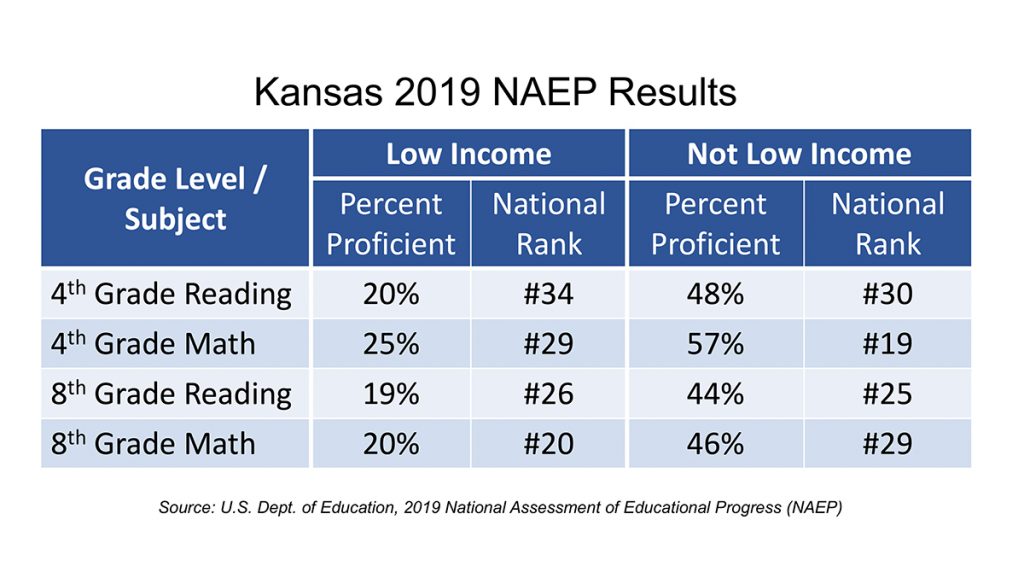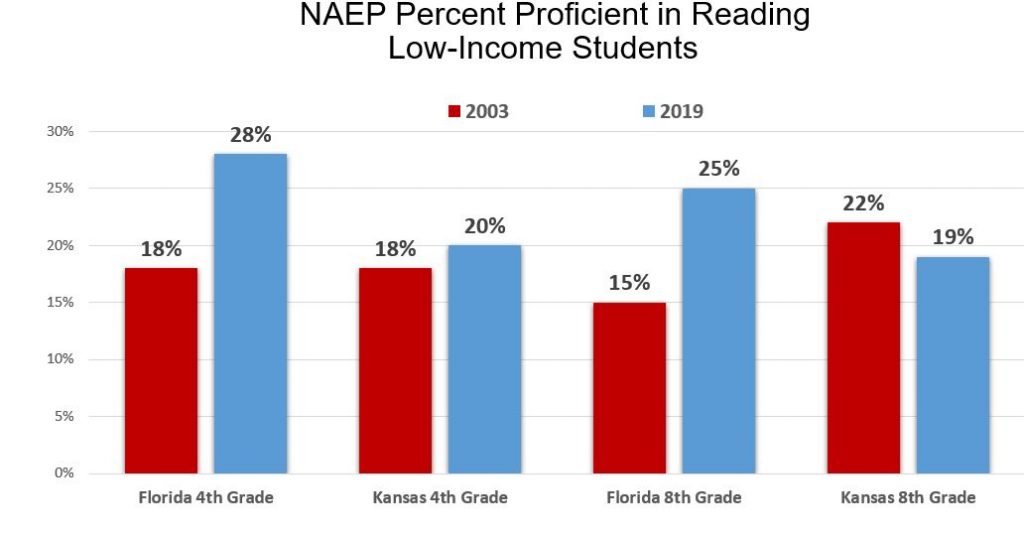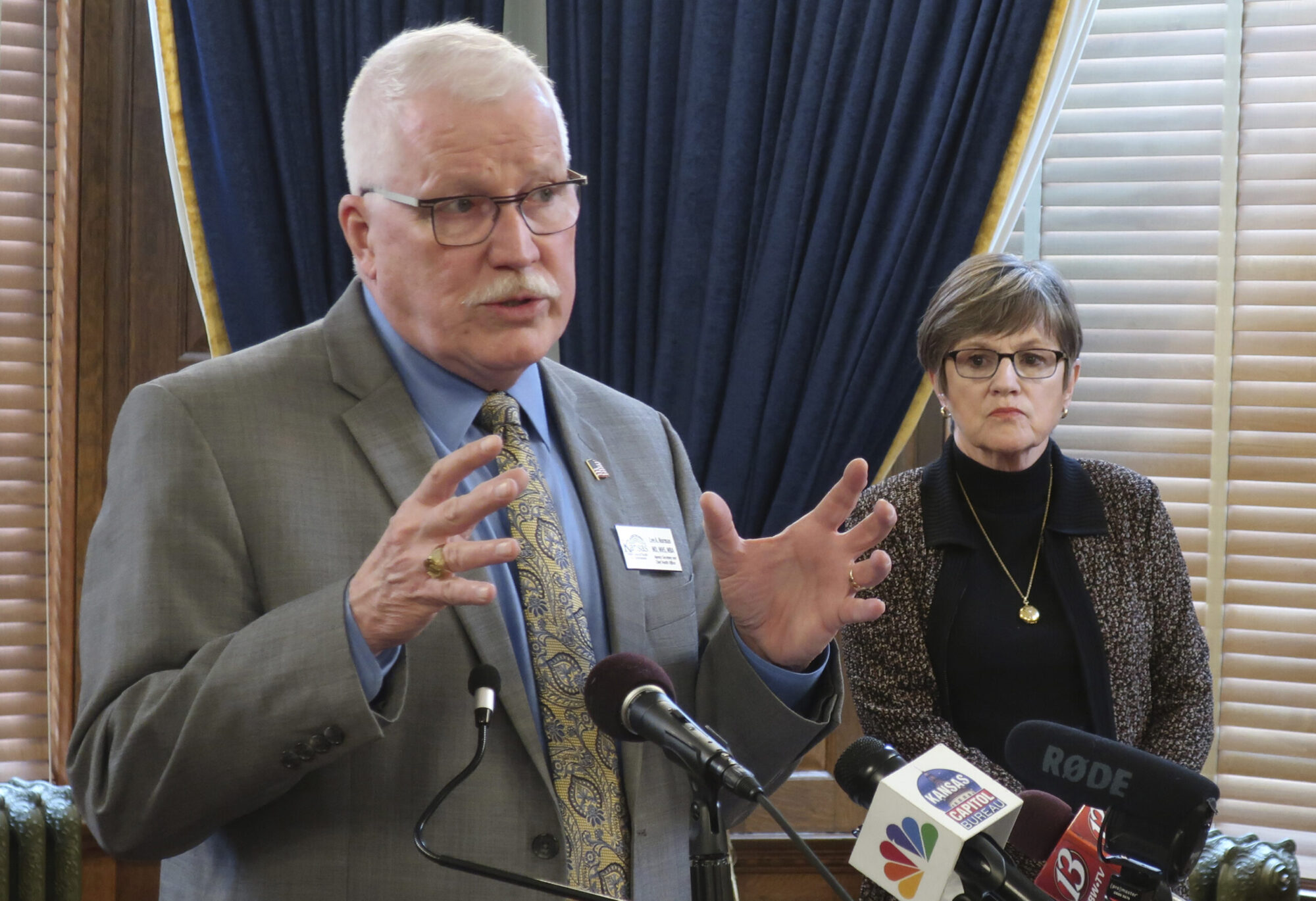Former Florida Gov. Jeb Bush says educational reform is “…the civil rights issue of our time…it’s the social justice issue of our time…and it’s the economic issue of our time.” Bush makes the claim in a new film, “Giving Kids a Fight Chance.” Commissioned by the Kansas Policy Institute, (which owns the Sentinel) and produced by Video Resolve, the film premiered last week at screenings in Overland Park and Wichita.
Rep. Renee Erickson, a Wichita Republican, attended the Wichita premier.
“I thought the film itself was very powerful,” she said. “It showed what is really possible if we have legislators and leaders who really want to do what’s right by kids.”
Bush made K-12 education reforms a central theme of his 1998 campaign for Florida governor, and he is credited with reforms that helped Florida students make dramatic gains in reading and math. For instance, Bush said Florida’s low-income students ranked 29th among the 31 states that participated in the National Assessment of Educational Progress (NAEP) reading exam in 1998. By 2007, Florida moved to #7 in the nation and the 2019 NAEP results show Florida is #1 in 4th-grade reading for low-income students.
“We had a rising achievement that was the envy of the nation,” Bush says.
“Giving Kids a Fighting Chance” begins by detailing some of those reforms. The state began grading schools (A, B, C, D, and F) based on student achievement and rewarding improvement. Schools that improved by a letter grade or got an ‘A’ received an additional $100 per student the next year and Bush said about 90 percent of that additional money was given to teachers in the form of bonuses.
Florida also eliminated social promotion in third grade, which is the critical time that students transition from learning how to read and begin reading to learn. Students who couldn’t read at grade level by the end of third grade were provided additional educational opportunities or held back until they could read at grade level.
“We turned the system upside down,” Bush tells the audience.
KPI’s film crew interviewed Florida policymakers, parents, and educators who benefitted from the Sunshine State reforms. Kansans are also featured prominently in the film, which juxtaposes Florida’s reforms with Kansas’ attempts to improve student outcomes for its students.
The National Assessment of Educational Progress released the nation’s report card a few weeks ago. The report revealed that Kansas kids are falling behind their peers in math and reading over the last few years.
For example, only 20 percent of low-income 4th graders are proficient in reading, according to the report. That percentage trails the national average of 21 percent. The percentage of Kansas fourth graders who are not from low-income families and are proficient in reading, 48 percent, also trails the national average of 50 percent.
Florida now beats Kansas on six of the eight measurements in the adjacent table. Kansas has a slightly higher proficiency level on 8th-grade math for low-income students, (20% vs. 19%) and both states are at 46% proficient for kids who aren’t low income in 8th-grade math.
Wade Moore, the founder of Urban Prep Academy in Wichita, told filmmakers that Kansas spends more than per student than Florida, but in general, student scores aren’t improving.
“Florida has made a difference, while in Kansas, we’re staying the same,” he said. “There are a lot of kids doing great, but what about the kids who aren’t?”
The Kansas Department of Education says NAEP comparisons since 2003 are valid and reliable. Since then, Kansas reading proficiency for 4th-grade low-income kids went from 18% to 20% while Florida jumped from 18% to 28%. Kansas’ 8th-grade proficiency dropped from 22% to 19%, but Florida increased from 15% to 25%.

And Florida’s large gains came while spending a lot less than Kansas. Florida spent $7,955 per pupil in 2003 according to U.S. Census data and spent $10,314 per pupil in 2017. Kansas funding increased at a much faster pace, going from $8,096 per pupil in 2003 to $13,196 per student in 2017.
“Kansas as a state has done a good job in funding,” former Kansas House Speaker Mike O’Neal says in the film. He tells filmmakers it’s a concern that the funding doesn’t seem to be reaching classrooms.
“Does anybody think schools spending billions and billions of dollars and not getting any results is OK?” He asks.
Florida has one of the largest school choice programs in the country, and Bush credits that opportunity with helping student outcomes improve in the state. Kansas has a very small school choice scholarship program, but Kansas’ program pales in comparison to Florida, which boasts six school choice scholarships that allow kids to go to the public or private school that best meets their needs..
Bush admits, however, that getting buy-in from the education community and others was a challenge.
“Generally, people were opposed to it,” he said. “…The issue of education is very political. The focus goes to the economic interests of the adults.”
Gerard Robinson, a former Florida Education Commissioner, spoke to theatergoers following the film’s premiere. He agreed that building a consensus for education reform was tricky, but he said it can be done with good leaders.
Bush did it by making the reforms a key focus of his administration.
“He galvanized educators. He got public school teachers… and they got non-education people involved,” Robinson said.
According to Erickson, it’s time to take a chance on educational reforms in Kansas.
“We’ve been doing the same thing — playing it safe and letting adult issues and concerns take precedence over what we know works for kids,” she said. “…If what we’re doing for decades hasn’t worked, give us a chance and let’s see what the results are. It can’t be any worse than what we are getting.”
Kansas Policy Institute will be showing the film to civic organizations and others. Tonight, “Giving Kids a Fighting Chance” will be shown to the Northeast Johnson County Conservatives. The group’s meeting starts at 6:30 p.m. at the Blue Moose in Praire Village and the film will be shown at 7 p.m.
“We’re going to release it publicly, and we’ll be doing vignette releases of some key points, but if there are groups in Kansas interested in hosting a screening, they can contact one of the KPI offices,” said KPI President James Franko.
Erickson will be encouraging others to see the film.
“I’m very encouraged by what Florida has been able to do and there’s no reason we can’t do something similar and have the results Florida has had here in Kansas,” she said.


